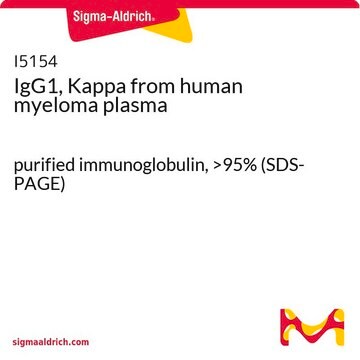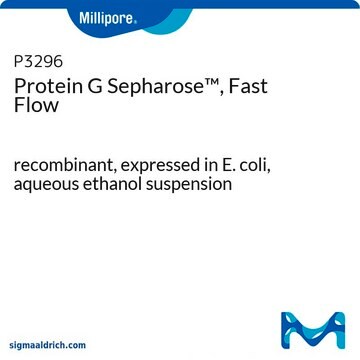M9035
IgG1, Kappa from murine myeloma
clone MOPC 31C, purified immunoglobulin, buffered aqueous solution
Synonym(s):
Mouse IgG1-κ
Sign Into View Organizational & Contract Pricing
All Photos(1)
About This Item
Recommended Products
biological source
mouse
Quality Level
conjugate
unconjugated
antibody form
purified immunoglobulin
clone
MOPC 31C, monoclonal
Assay
≥95% (gel filtration, HPLC)
form
buffered aqueous solution
concentration
≥1 mg/mL
shipped in
dry ice
storage temp.
−20°C
target post-translational modification
unmodified
Looking for similar products? Visit Product Comparison Guide
General description
Immunoglobulins (Igs) belongs to the immunoglobulin super-family. IgG is the abundant immunoglobulin in human serum. The four classes of IgG can be IgG1, IgG2, IgG3 and IgG4.
Mammalian immunoglobins contain either lambda or kappa light chains.
Specificity
Specificity is determined by mouse monoclonal isotyping strips. The purified immunoglobulin preparation is non-reactive with mouse IgA, IgM, IgG2a, IgG2b, or IgG3.
Application
IgG1, Kappa from murine myeloma has been used in:
- chromatin immunoprecipitation (ChIP)
- immunofluorescence
- immunocapture
- enzyme immunoassay
- immunohistochemistry
Biochem/physiol Actions
IgG1 is the most abundant and its deficiency results in hypogammaglobulinemia. IgG antibody have enormous therapeutic potential and the Fc region is involved the development of therapeutic antibody.
Physical form
Solution in 0.02 M Tris buffered saline, pH 8.0, containing 0.02% sodium azide
Disclaimer
Unless otherwise stated in our catalog or other company documentation accompanying the product(s), our products are intended for research use only and are not to be used for any other purpose, which includes but is not limited to, unauthorized commercial uses, in vitro diagnostic uses, ex vivo or in vivo therapeutic uses or any type of consumption or application to humans or animals.
Storage Class Code
12 - Non Combustible Liquids
WGK
WGK 1
Flash Point(F)
Not applicable
Flash Point(C)
Not applicable
Personal Protective Equipment
dust mask type N95 (US), Eyeshields, Gloves
Certificates of Analysis (COA)
Search for Certificates of Analysis (COA) by entering the products Lot/Batch Number. Lot and Batch Numbers can be found on a product’s label following the words ‘Lot’ or ‘Batch’.
Already Own This Product?
Find documentation for the products that you have recently purchased in the Document Library.
Customers Also Viewed
Margarida Varela Dos Santos et al.
Gynecologic oncology, 176, 76-81 (2023-07-22)
To analyze the expression and prognostic role of L1CAM in tubo-ovarian high-grade serous carcinoma (HGSC). L1CAM protein expression by immunohistochemistry was analyzed in 644 HGSC (413 effusions, 231 surgical specimens). Expression was analyzed for association with clinicopathologic parameters and survival.
Jing Wen et al.
Journal of vascular surgery, 46(5), 1014-1025 (2007-10-02)
The syndecan family of cell surface proteoglycans can bind and modulate the activity of a diverse group of soluble and insoluble ligands, which have been shown to modulate events relevant to acute tissue repair and chronic injury responses. The expression
Margarida Varela Dos Santos et al.
Clinical & experimental metastasis, 41(1), 69-76 (2023-12-23)
The objective of this study was to analyze the expression and prognostic role of the tight junction protein occludin in high-grade serous carcinoma (HGSC). Occludin protein expression by immunohistochemistry was analyzed in 602 HGSC (417 effusions, 185 surgical specimens). Expression
Regulation of the transcription factor EB-PGC1alpha axis by beclin-1 controls mitochondrial quality and cardiomyocyte death under stress
Ma X, et al.
Molecular and Cellular Biology, 35(6), 956-976 (2015)
Elisabeth Smogeli et al.
BMC cancer, 16, 596-596 (2016-08-05)
L1 cell adhesion molecule (L1CAM) overexpression has been reported to be strongly associated with poor prognosis in early stage endometrial cancer (EC). We aimed at the validation of L1CAM as a marker of poor prognosis in an independent study population.
Our team of scientists has experience in all areas of research including Life Science, Material Science, Chemical Synthesis, Chromatography, Analytical and many others.
Contact Technical Service












